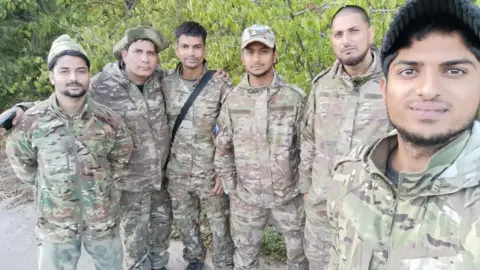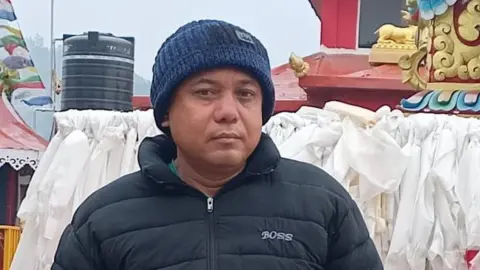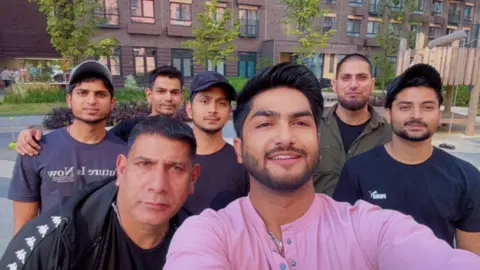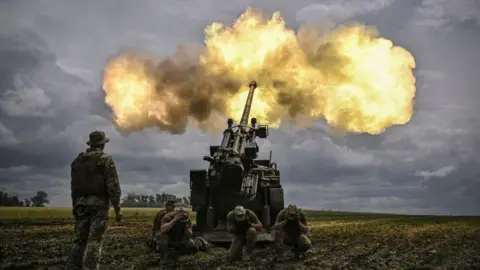 BBC
BBCLast week, the Indian government announced that Russia had discharged dozens of the 91 Indians who were duped into fighting for Russian forces in the country’s war with Ukraine. Several of them have since returned home, while the process to bring others back is under way. The BBC’s Neyaz Farooquee spoke to some of the men about their struggles.
“I am in panic. I am not sure if I will return safely or in a box. Please save me.”
This is the message Urgen Tamang, a former Indian soldier, sent to the BBC from outside a southern Ukrainian city, a few days before he was discharged from the frontlines in Russia’s war against Ukraine, which entered its third year this February.
Mr Tamang is among the 91 Indians who were forced into fighting in the war. Most of them are from poor families and were lured by agents with the promise of money and jobs, sometimes as “helpers” in the Russian army.
Instead, they were sent to the war zone. Many of them said they were stationed in parts of Ukraine under Russian control, where they had to navigate landmines, drones, missiles and sniper attacks with little to no military training.
Nine Indians have died in the conflict so far and Indian authorities say they have arrested 19 people for human trafficking.
In July, Russia promised an early release of all Indians fighting in its army, following a visit by Indian Prime Minister Narendra Modi to Moscow, during which he raised the issue with President Vladimir Putin. The two countries have traditionally shared a warm relationship.
Forty-five of them have been discharged since then. Some have safely returned home, while others like Mr Tamang are on their way.

“I can’t believe I am out of there,” said Sunil Karwa, an electrician from Rajasthan who joined the Russian army in February. Posted near Bakhmut, an eastern Ukraine city that has seen intense fighting, he was at the Moscow airport waiting to board his flight when he spoke to the BBC.
Mr Karwa described scenes of deaths and destruction, a reality which hit him the hardest when a man from his neighbouring village was shot on the battlefield.
“They sent him back on the frontline 15 days after the injury and he fainted in the field. He is paralysed now,” he said.
Like him, most of the other recruits were also blue-collar workers aged between 19 and 35, who were hired by agents based in India, Dubai and Russia.
They say their contracts were in Russian, a language they didn’t understand. Yet they signed it in the hope of getting better opportunities.
“The process was so quick – just a few signatures and photos and we were in [the army],” Mr Karwa said.
Raja Pathan joined the army as a last resort in February, after an education consultant deceived him into enrolling in a non-existent college.
“When I got there, I saw banners advertising recruitments for the army. By then, I had spent so much time and money that I decided to join anyway,” he said.
It was the death of two friends, which eventually pushed Mr Pathan to leave. He was released in August with the help of a sympathetic Russian commander who facilitated his exit.
Now based in Moscow, he helps other Indians escape from there.

Mohammad Sufyan from the southern state of Telangana returned to India on 12 September with five other men.
Safe in his home, he carries the trauma of surviving on the frontline. “There was little rest there and in the beginning, I couldn’t speak to my family for 25 days,” he said.
The most scarring moment came in February when his friend Hemil Mangukiya – an Indian man from Gujarat state – was killed right before his eyes.
“He was merely 15 metres from me, digging a trench near Krynky [in Kherson], when a missile landed,” recalled Mr Sufyan. “I put his dead body in the truck with my own hands.”
“After seeing the dead body of my friend, I didn’t have the strength for anything,” he added.
After the death, Mr Sufyan and other Indians stuck there released a video pleading for help, which reached Indian MP Asaduddin Owaisi, who raised the matter with the foreign ministry. Families of the men had also appealed to the Indian government for help in bringing them back.
 Getty Images
Getty Images“It is a miracle I got back home,” said Azad Yusuf Kumar, a resident of Indian-administered Kashmir, who was part of Mr Sufyan’s group in the army.
“One minute you are digging a trench, and the next, an artillery falls and burns everything down. It was all a matter of luck if it fell on you or someone else.”
In February, Mr Kumar had told the BBC how he had shot his foot by mistake during training. “My commander kept saying, use your right hand to shoot, use your left hand to shoot, shoot above, shoot down,” he had said. “I had never touched a gun. It was extremely cold, and with the gun in my left hand, I ended up shooting my foot.”
Now back in Kashmir, he talks about how his commander had accused him of deliberately shooting himself to avoid going to the frontline.
“But I am lucky I did not go to fight. Four men from my camp died in an attack at that time. I could’ve been one of them,” he said.
Though recent discharges brought relief to many, those still in Russia face growing desperation as their release is delayed.
Mr Tamang, who joined the Russian army in January, had earlier told The Indian Express newspaper through his local councillor, Rabi Pradhan, that 13 out of 15 non-Russian members of his unit had died.
The fact that he was sent to the frontline at least twice after signing his discharge letter in August heightened his fears – and mistrust in the process.
On 15 September, he was on his way to Moscow but still doubtful if he was truly heading home. “I am out, but I will keep sending you my location,” he said.
When he last texted, he had left Ukraine, hoping to continue his journey home.







